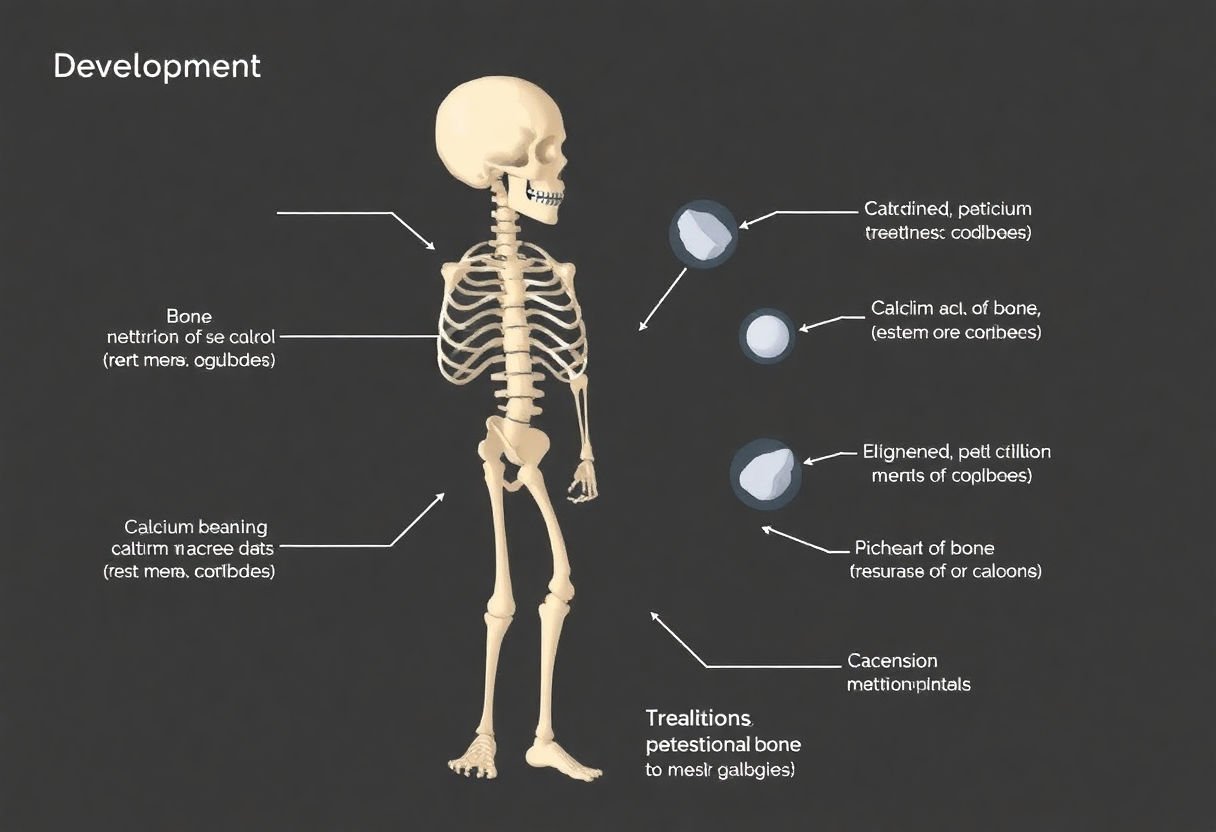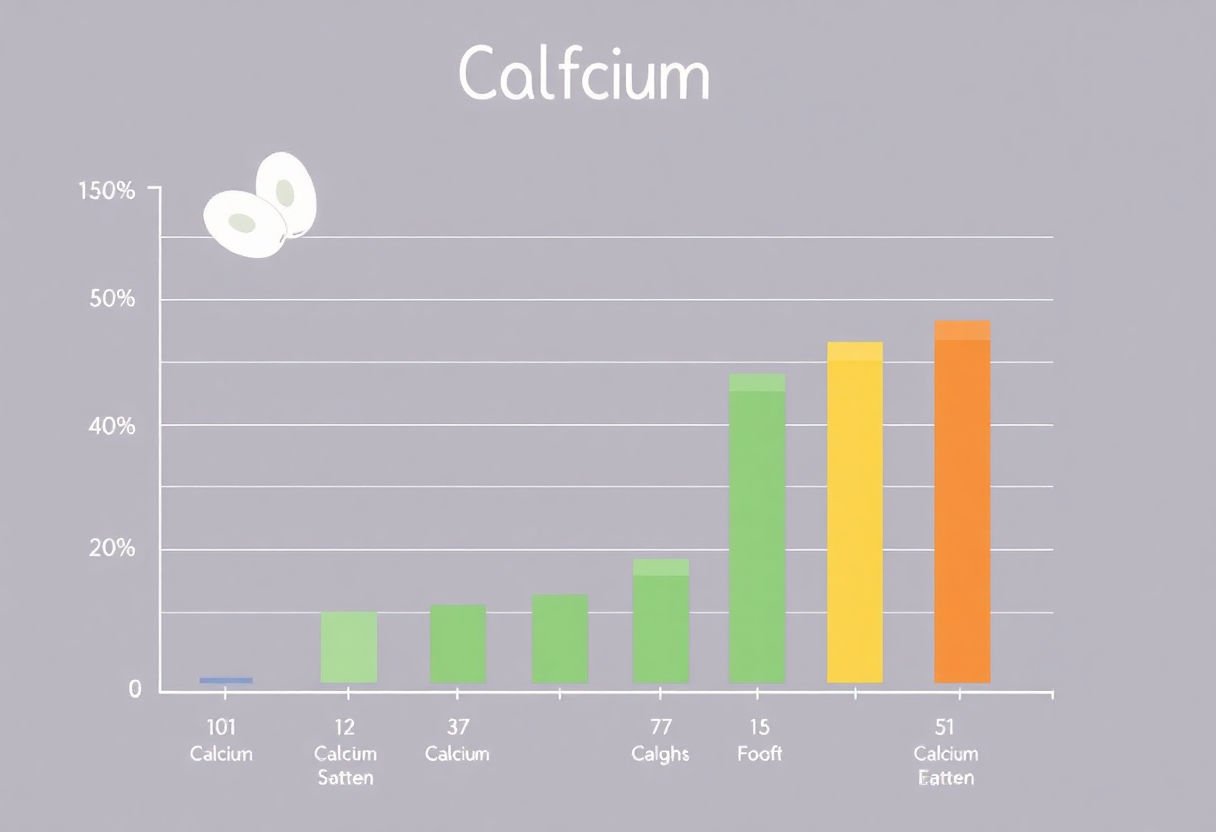Calcium is a vital component in children’s diets, crucial for growing strong and healthy bones. However, achieving adequate calcium intake can be challenging with traditional dietary sources alone. Enter the innovative world of kids’ calcium gummies—a delightful and convenient solution that is transforming how children consume this essential mineral. This article explores the significant role calcium plays in growth, tackles dietary challenges, and highlights the numerous benefits of integrating calcium gummies into daily routines. Discover how these tasty supplements can enhance bone health, provide additional health benefits, and how to select the best options for your child’s needs.
Key Takeaways
- Calcium gummies offer a palatable and convenient way for children to meet their daily calcium needs, aiding in the proper development of strong bones.
- Introducing calcium gummies can help circumvent common dietary challenges, making it easier for children who are picky eaters to consume sufficient calcium.
- These gummies support not only bone health but also other vital functions like nerve function and muscle health.
- Choosing high-quality calcium gummies ensures children receive maximum benefits while maintaining safety standards.
- While calcium gummies are beneficial, it is essential to consider potential drawbacks and consume them as part of a balanced diet.
Why Calcium is Essential for Kids

Calcium plays a critical role in the growth and development of children, marking it as essential for their overall health. As one of the most abundant minerals in the human body, calcium is crucial for building strong bones and teeth. During childhood, bones are rapidly growing, making calcium intake paramount for preventing future bone-related issues, such as osteoporosis or fractures.
Moreover, calcium is vital for numerous physiological processes in children. It is instrumental in supporting proper muscle function, including the contraction and relaxation of muscles, which is critical for activities such as running and playing. Additionally, calcium aids in nerve transmission, helping to facilitate communication between the brain and various parts of the body, which is essential for cognitive development and motor skills.
The recommended daily intake of calcium varies by age, yet ensuring children consume adequate levels can be challenging. For example, children aged 4 to 8 years require approximately 1,000 mg of calcium per day. Such intake ensures that the developing skeletal system has enough resources to build mass and strength.
Incorporating sufficient calcium in a child’s diet also supports healthy blood clotting, which is fundamental for responding to injuries. Therefore, ensuring that children receive appropriate levels of calcium not only fortifies their developing skeletal system but also underpins a multitude of bodily functions, underscoring its essential status in a child’s nutrition regimen. By prioritizing calcium intake, parents can help lay a strong foundation for their child’s lifelong health.
Challenges in Getting Calcium Through Diet

Children often face significant challenges when striving to meet their daily calcium needs through diet alone. Calcium-rich foods, such as dairy products, leafy greens, and fortified cereals, may not always be appealing to kids. A child’s aversion to these foods could stem from taste preferences, texture issues, or even food allergies, making it difficult for parents to ensure adequate calcium intake. Furthermore, lactose intolerance, which affects many children, can limit the consumption of traditional calcium sources like milk and cheese, further compounding this issue.
The modern diet, often high in processed foods and sugars, can also interfere with calcium absorption and utilization. Foods high in sodium and caffeine, commonly found in snacks and beverages consumed by children, can negatively impact calcium retention in the body. This dietary landscape makes it challenging for children to obtain the recommended daily calcium intake crucial for their growing bodies.
Additionally, busy family schedules may hinder the preparation and consumption of well-balanced meals necessary for optimal nutrition. Parents juggling multiple responsibilities might find it hard to consistently provide meals rich in essential nutrients such as calcium. The convenience of fast food or ready-to-eat meals, which often lack sufficient calcium, contributes to these challenges.
Ultimately, calcium insufficiency during childhood can have lasting effects, potentially leading to weaker bone density and increased risk of fractures. Addressing these challenges with practical solutions is imperative to ensure children receive the necessary calcium for their developmental needs.
Benefits of Calcium Gummies
Calcium gummies have revolutionized the way parents can ensure their children receive adequate calcium intake. Unlike traditional supplements, calcium gummies offer a pleasurable and practical alternative that resonates well with children.
Taste and Convenience are among the most significant advantages of calcium gummies. Many children are notoriously selective about their food choices, and this includes being reluctant to consume traditional supplements that lack appealing flavors. Calcium gummies are designed to be both delicious and engaging, combining essential nutrients with enjoyable flavors and appealing textures that children love. The sweet taste and chewy form make them a treat rather than a chore, promoting regular consumption without the struggle often associated with pills or liquid supplements.
Furthermore, the convenience of calcium gummies cannot be overstated. Easily portable, they can be administered without water, making them perfect for busy families on the go. This portability ensures that they can be included effortlessly into daily routines, whether as a lunchtime treat at school or a snack during extracurricular activities.
The user-friendly nature of calcium gummies addresses some of the common challenges faced by parents in providing necessary nutrients. By seamlessly integrating into a child’s diet without resistance, they contribute effectively to a well-rounded nutritional intake. This ensures that children receive the vital benefits of calcium, which are indispensable for their developmental needs, in a manner that is straightforward and stress-free.
Enhancing Bone Health in Kids
Calcium is a crucial mineral in establishing a solid foundation for children’s bone health. During the formative years, bones undergo rapid growth and mineralization, requiring a steady and adequate supply of calcium to support this dynamic process. Calcium is a building block that contributes to bone density and overall skeletal strength.
Calcium gummies offer a proactive approach to ensuring children receive the required daily intake of calcium in an accessible manner. By incorporating these gummies into a child’s routine, parents can help fortify their offspring’s bone health in a tangible way. The assimilation of calcium into the body is enhanced by the presence of vitamin D, commonly included in calcium gummy formulations. Vitamin D plays a vital role in calcium absorption, ensuring that this essential mineral is effectively utilized in bone formation and maintenance.
Moreover, calcium gummies provide an enjoyable and kid-friendly alternative to traditional supplements, often met with resistance due to taste and swallowing difficulty. The palatable flavors and chewable nature increase compliance, making it easier for children to consistently obtain the calcium they need for optimal bone development.
Incorporating calcium gummies into a child’s diet can significantly contribute to achieving the recommended dietary allowance (RDA) of calcium. For instance, a typical gummy may provide about 10-20% of the daily calcium requirement, thereby simplifying the task of meeting nutritional goals. By supporting bone mineralization and density, these gummies play a pivotal role in enhancing children’s bone health, setting the foundation for a robust and resilient skeletal system throughout their lives.
Other Health Benefits

Calcium gummies are not only vital for promoting bone health, but they also offer numerous additional health benefits that enhance overall well-being in children. These gummies are often fortified with other essential nutrients, making them a comprehensive supplement supporting several bodily functions.
Supports Dental Health: Just as calcium is crucial for strong bones, it plays a key role in maintaining healthy teeth. Consistent calcium intake through gummies can help prevent tooth decay and support the development of sturdy enamel, ensuring that children have healthy and resilient teeth.
Enhances Muscle Function: Calcium is integral to muscle contraction, and an adequate intake can improve muscle movement and prevent cramps. This is especially beneficial for active children, who require optimal muscle functioning for physical activities and sports.
Helps in Blood Clotting: The role of calcium in blood clotting is critical. By ensuring a steady gradient of calcium through gummies, children can maintain efficient blood coagulation processes, which are essential for healing wounds and preventing excessive bleeding.
Aids in Healthy Weight Management: Emerging research suggests that calcium intake may influence fat metabolism, potentially aiding in weight management for children. This can contribute to maintaining a healthy body weight and preventing obesity-related issues.
Boosts Immune System: Some formulations of calcium gummies include vitamin D, which is known to enhance the immune system. By combining these nutrients, gummies can provide an immune-boosting effect, offering children an added layer of protection against common illnesses.
Overall, incorporating calcium gummies into a child’s diet can offer a comprehensive approach to not only strengthening bones but also fortifying other aspects of their health, supporting a robust and dynamic lifestyle.
Choosing the Right Calcium Gummies

Choosing the right calcium gummies for your child is crucial for ensuring both efficacy and safety. Several factors should be considered to find a supplement that meets your child’s nutritional needs while being appealing enough for consistent consumption.
First, examine the ingredient list. High-quality calcium gummies should contain adequate amounts of calcium, often in the form of calcium citrate or calcium carbonate, known for their excellent absorption rates in the body. It is also advisable to look for products enriched with vitamin D, as it significantly enhances calcium absorption.
The taste and texture of the gummies are equally essential, given that children are more likely to consume supplements regularly if they taste good. Many manufacturers offer a variety of flavors such as orange, strawberry, and lemon, making the supplement more appealing to younger palates.
Consider the sugar content in the gummies. While some amount is often necessary to make the taste pleasant, excessive sugar could contribute to dental issues and may negate the health benefits. Select products that use natural sweeteners or are labeled as low-sugar alternatives.
It’s also important to pay attention to any allergens listed on the product label. For children with allergies or specific dietary needs, choosing gummies free from common allergens like gluten, lactose, or artificial colors is vital.
Lastly, always verify the reputation of the brand. Established brands often conduct rigorous testing to ensure their products meet safety standards. Consulting with a pediatrician for personalized advice can also be beneficial in selecting the most appropriate calcium gummy supplement tailored to your child’s needs.
Possible Drawbacks and Safety Considerations

When introducing calcium gummies into a child’s diet, it’s important to be aware of the possible drawbacks and safety considerations to ensure they are beneficial without adverse effects.
Overconsumption Risks
Calcium gummies are often crafted with appealing flavors that children may find irresistible, leading to the risk of overconsumption. Consuming too much calcium can result in hypercalcemia, characterized by nausea, vomiting, and kidney issues. To prevent these risks, it is crucial to adhere to the recommended daily allowance for calcium, which is about 1,000 mg for children aged 4 to 8 and 1,300 mg for those aged 9 to 18.
Added Sugars and Calories
While calcium gummies are a convenient option, they may contain added sugars and calories that can contribute to unhealthy weight gain and dental cavities. Parents should scrutinize product labels to select options with minimal sugar content.
Allergy Considerations
Parents must also check for potential allergens within the ingredients, particularly if their child has food allergies. Some gummies may contain gelatin or artificial flavoring, which could trigger allergic reactions in sensitive individuals.
Choking Hazards
For younger children, the risk of choking is a vital safety consideration. Gummies can pose a choking hazard if not chewed properly. Ensuring that the gummies are chewed thoroughly and are appropriate in size for the child’s age can mitigate this risk.
By being mindful of these considerations, parents can successfully incorporate calcium gummies into their child’s diet, reaping the benefits of stronger bones while minimizing any potential risks.
Conclusion
Incorporating calcium gummies into a child’s diet is a practical approach to overcoming dietary gaps in calcium intake, thereby promoting optimal bone health. These gummies provide a convenient and enjoyable solution to the challenges of ensuring adequate calcium levels amidst busy lifestyles and picky eating habits. As demand for effective and child-friendly supplements rises, selecting quality gummies remains essential. Ultimately, prioritizing calcium intake through innovative forms like gummies fosters not just stronger bones but overall well-being, paving the way for healthier growth and development.
Frequently Asked Questions
How much calcium do children need daily and can gummies meet this requirement?
Children’s calcium needs vary by age, typically between 700 to 1,300 mg per day. Calcium gummies can effectively help meet this requirement, but it is crucial to follow the recommended serving size to avoid overconsumption.
Are calcium gummies safe for all children?
Calcium gummies are generally safe when consumed as directed. However, parents should consult with a pediatrician, especially if their child has health concerns or is taking other supplements or medications.
What if my child doesn’t like the taste of calcium gummies?
Calcium gummies are designed to be palatable with natural flavors, but preferences can vary. If your child dislikes the flavor, try different brands or forms such as chewable tablets, ensuring they still receive adequate calcium.
Can my child take calcium gummies with other vitamin supplements?
In most cases, calcium gummies can be taken alongside other supplements. It’s wise to consult with a healthcare professional to ensure there are no potential interactions or excessive intake of certain nutrients.
What should I do if my child experiences side effects from calcium gummies?
If your child experiences side effects such as stomach upset or constipation, consider reducing the dosage and consult with a healthcare professional. They can recommend adjustments or alternatives for calcium supplementation.


